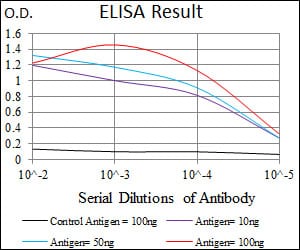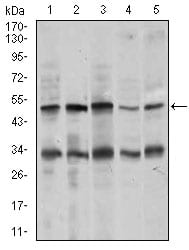

| WB | 1/500 - 1/2000 | Human,Mouse,Rat |
| IF | 咨询技术 | Human,Mouse,Rat |
| IHC | 咨询技术 | Human,Mouse,Rat |
| ICC | 技术咨询 | Human,Mouse,Rat |
| FCM | 咨询技术 | Human,Mouse,Rat |
| Elisa | 1/10000 | Human,Mouse,Rat |
| Aliases | CGA |
| Entrez GeneID | 1113 |
| clone | 1A6B6 |
| WB Predicted band size | 50.7kDa |
| Host/Isotype | Mouse IgG1 |
| Antibody Type | Primary antibody |
| Storage | Store at 4°C short term. Aliquot and store at -20°C long term. Avoid freeze/thaw cycles. |
| Species Reactivity | Human,Mouse |
| Immunogen | Purified recombinant fragment of human CHGA (AA: 87-252 ) expressed in E. Coli. |
| Formulation | Purified antibody in PBS with 0.05% sodium azide |
+ +
以下是关于CHGA(嗜铬粒蛋白A)抗体的3篇代表性文献,按研究领域分类整理:
---
1. **文献名称**:Chromogranin A as a biomarker in neuroendocrine tumors
**作者**:Lloyd RV et al.
**摘要**:研究验证了CHGA抗体在神经内分泌肿瘤诊断中的应用,通过免疫组化证实其在胰腺、胃肠等肿瘤中的高特异性表达,支持其作为神经内分泌分化标志物的临床价值。
2. **文献名称**:Chromogranin A in heart failure: a novel neurohumoral factor?
**作者**:O'Connor DT et al.
**摘要**:探讨CHGA在心血管疾病中的作用,利用ELISA和Western blot分析患者血浆样本,发现CHGA水平与心力衰竭严重程度相关,提示其可能参与病理生理调控。
3. **文献名称**:Antibody specificity in Chromogranin A research: a comparative study
**作者**:Portela-Gomes GM et al.
**摘要**:比较不同商业化CHGA抗体的灵敏度和特异性,通过免疫荧光与免疫印迹实验,提出标准化抗体选择对提高实验可重复性的重要性。
---
**领域覆盖**:诊断标志物(肿瘤)、心血管疾病、实验方法学优化。如需扩展至细胞机制研究,可补充关于分泌颗粒调控的文献(如Bartolomucci A等人研究)。
Chromogranin A (CHGA) is a 439-amino-acid acidic glycoprotein belonging to the granin family, primarily found in secretory vesicles of neuroendocrine cells and neurons. It plays a critical role in regulating hormone/peptide storage, secretion, and processing by stabilizing secretory granule contents. CHGA is co-released with catecholamines, peptides, and hormones, making it a universal marker for neuroendocrine differentiation.
CHGA antibodies are essential tools in diagnostics and research for identifying neuroendocrine tumors (NETs), such as pheochromocytomas, paragangliomas, carcinoids, and neuroblastomas. These antibodies target specific epitopes of CHGA, enabling detection via immunohistochemistry (IHC) or immunoassays (ELISA). Elevated CHGA levels in serum or tissue often correlate with tumor burden, aiding in disease monitoring.
However, CHGA expression varies by tumor type and differentiation status. Some poorly differentiated NETs may show reduced or absent CHGA, requiring complementary markers (e.g., synaptophysin) for confirmation. Non-neoplastic conditions, like chronic atrophic gastritis or renal insufficiency, can also elevate CHGA, necessitating clinical correlation.
Overall, CHGA antibodies remain pivotal in understanding neuroendocrine system physiology and pathology, bridging laboratory research with clinical diagnostics.
×